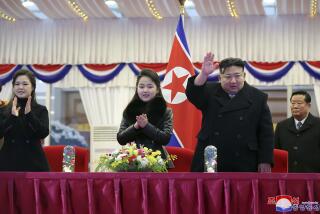Moscow Group Seeks Amnesty for All Soviet Political Prisoners
A human rights group in Moscow appealed for an amnesty for all Soviet political prisoners Monday, the eve of dissident Andrei D. Sakharov’s expected return from nearly seven years of forced exile in the closed city of Gorky.
Although the Nobel Peace Prize winner has stopped answering telephone calls to his Gorky apartment, he and his wife, Yelena Bonner, said earlier that they will return on the overnight train due to arrive in the Soviet capital this morning.
Bonner told a caller from Denmark on Sunday that her husband would not give interviews upon his return, but conversations since his dramatic release from exile suggest an undiminished determination to campaign for human rights.
Appeal to Gorbachev
In Moscow, the Group to Establish Trust Between the U.S.S.R. and America, a human rights group, called for Soviet leader Mikhail S. Gorbachev to follow up his release of Sakharov with freedom for other political prisoners.
“We cannot separate this development from the general international situation and take this opportunity to call at the very soonest for a general amnesty of the political prisoners of the U.S.S.R,” the group said in a statement.
The organization, welcoming the return of Sakharov and Bonner, said, “A political amnesty would strengthen the belief in the process that has been taking place lately in Soviet society.”
Sakharov’s release from nearly seven years of exile in the industrial city 250 miles east of Moscow was announced to the world last Friday, but the physicist had learned of it last Tuesday in a telephone call from Gorbachev.
Amnesty a Reported Topic
Sakharov, who earlier wrote to Gorbachev about political prisoners, reportedly discussed such an amnesty during his phone conversation with the Soviet leader.
In London, meanwhile, dissident Soviet poet Irina Ratushinskaya, allowed to leave the Soviet Union last week, met with British Prime Minister Margaret Thatcher, and the poet’s husband said the couple intends to remain in the West.
Ratushinskaya, who arrived in London last Thursday on a three-month visa to seek medical help, said she discussed Soviet problems during her 35-minute meeting with Thatcher.
Earlier, her husband, Igor Geraschenko, a physicist and human rights activist, told reporters at the couple’s first news conference that they have decided to remain in the West.
“Irina and I intend to live in the West. . . . I consider the possibility of a return to the Soviet Union will only become a reality when respect for human rights will become something real not only in words but in deeds,” he said through an interpreter.
Ordeal in Labor Camp
Ratushinskaya, who describes herself as a Christian, spoke of her ordeal in a labor camp where she served four years of a seven-year sentence for “anti-Soviet agitation and propaganda” at the time of her unexpected release in October.
She looked tired and talked quietly.
“The regime in the women’s political camp was adapted specifically . . . to create such conditions that we would not want to continue human rights activities in the future. Frequently, measures applied to us were senseless humiliations,” she said in faltering English, sometimes resorting to an interpreter.
“As a rule, actual physical blows were not used. They did not need this. They refined it down to extreme cold, extreme filth, extreme hunger. . . . Conditions were geared to ensure that you died when you left the camp,” she said.
“I went into prison as a healthy young woman, and three years later I was certain I would not live out this year,” she added.
Ratushinskaya, 32, is regarded by Western critics as one of the most talented living Soviet poets. She said earlier that while in prison, she wrote 250 poems by scratching them on bars of soap and then washing away the verses after each one had been committed to memory.
Effort to Improve Image
Ratushinskaya said she believes that her release, and the freeing of Sakharov from internal exile, are part of an effort by Gorbachev to improve his country’s image in the West.
“I think he is more clever and more realistic than any other authority,” she said.
Ratushinskaya also told reporters that she has tried her first poem in English, and she released it at her London news conference:
KGB remember please
We’re not afraid (of) your teeth
We’re not afraid (of) your hand
That’s the beginning of your end.
More to Read
Start your day right
Sign up for Essential California for news, features and recommendations from the L.A. Times and beyond in your inbox six days a week.
You may occasionally receive promotional content from the Los Angeles Times.






